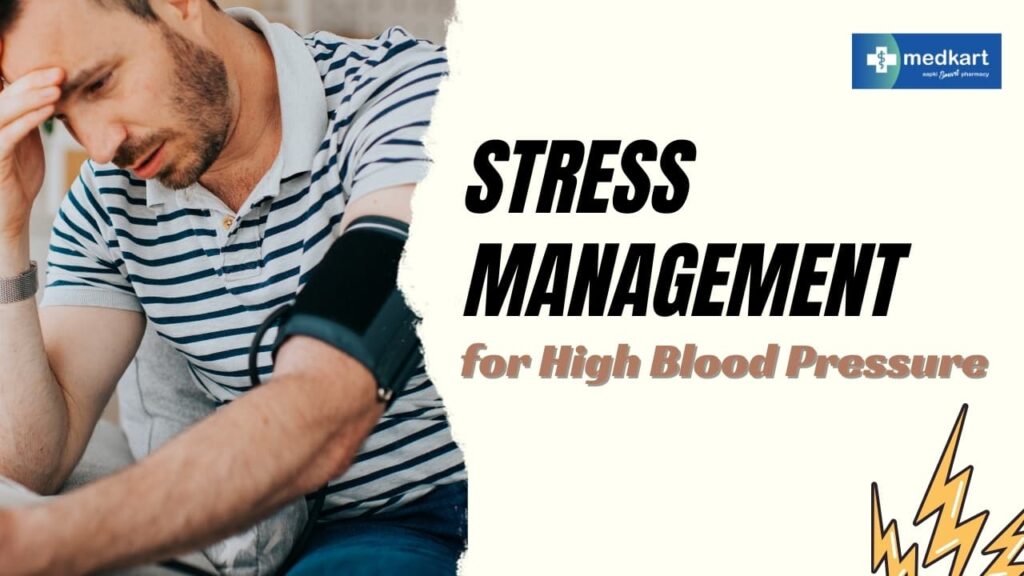Last updated on April 17th, 2025 at 02:47 pm
 Stress has become very natural for many people as it is creeping into our daily lives through work pressures, family responsibilities, and the constant demands of modern living. While it’s normal to experience stress, chronic stress can be dangerous, especially for those with high blood pressure (hypertension). Stress not only impacts your mental well-being, but it can also be dangerous to your cardiovascular health, raising your blood pressure to risky levels.
Stress has become very natural for many people as it is creeping into our daily lives through work pressures, family responsibilities, and the constant demands of modern living. While it’s normal to experience stress, chronic stress can be dangerous, especially for those with high blood pressure (hypertension). Stress not only impacts your mental well-being, but it can also be dangerous to your cardiovascular health, raising your blood pressure to risky levels.
Understanding the Connection Between Stress and High Blood Pressure
It is necessary to understand how stress affects blood pressure. When you’re stressed, your body responds by releasing hormones like adrenaline and cortisol. These hormones prepare your body for “fight or flight” by increasing your heart rate and narrowing your blood vessels. This temporary spike in blood pressure is normal. However, when stress becomes a regular phenomenon, these constant spikes can lead to long-term health problems like hypertension.
Living with hypertension means your heart works harder to pump blood, which can strain your arteries and organs, increasing the risk of heart attack, stroke, and kidney disease. So, while stress alone might not directly cause it, but it is one of the significant causes of sudden high blood pressure.
Why Stress Management is Essential for Blood Pressure Control
For individuals with high blood pressure, managing stress effectively is just as important as taking medication. Incorporating stress management techniques can complement medication to lower blood pressure and improve overall heart health. Additionally, practicing self-care through these methods can help reduce reliance on medications in the long term.
Stress Management for High Blood Pressure
1. Mindful Breathing and Meditation
Mindful breathing is one of the simplest and yet the most effective stress management techniques. When we are stressed, our breathing mostly becomes shallow, which can further increase tension. By practicing deep, slow breathing, we can activate our body’s parasympathetic nervous system, which promotes relaxation and blood pressure control.
How to practice mindful breathing : Try inhaling slowly through your nose for four counts, holding your breath for four counts, and then exhaling for four counts. Repeat this cycle for five to ten minutes each day.
Meditation: Regular meditation can also help. Studies show that regular meditation reduces stress and lowers our blood pressure. Even just 10 minutes of quiet, focused meditation can have a calming effect on your mind and body.
2. Exercise: The Natural Blood Pressure Regulator
Exercise is another powerful, natural way to lower your blood pressure. Regular physical activity not only reduces stress but also strengthens your heart, making it more efficient at pumping blood.
Walking, Yoga, and Tai Chi: Walking is a simple, low-impact exercise that can reduce stress and hypertension. Similarly, practices like yoga and Tai Chi combine physical movement with mindfulness and deep breathing which makes them excellent for stress and blood pressure management.
Aim for 30 minutes a day: Try to do some form of physical activity for at least 30 minutes each day. It doesn’t have to be intense—a brisk walk or a light yoga session can do wonders for your stress levels and blood pressure control.

3. Balanced Nutrition for Hypertension Self-Care
Diet plays a critical role in high blood pressure stress management. Eating a well-balanced diet which is rich in fruits, vegetables, whole grains, and lean proteins can naturally lower your blood pressure.
Reduce sodium intake: One of the most important change in diet for blood pressure control is reducing sodium. Too much salt in our diet can raise blood pressure and strain your heart. Opt for fresh foods over processed ones and flavor your meals with herbs and spices instead of salt.
Include stress-busting nutrients: Foods that are rich in magnesium, potassium, and antioxidants can help lower stress and blood pressure. Dark leafy greens, bananas, nuts, and seeds are great sources of these nutrients. Omega-3 fatty acids found in fish like salmon and flaxseeds are also known to reduce stress and promote heart health.
4. Adequate Sleep: A Pillar of Stress Management
Lack of sleep is a significant stressor and can exacerbate high blood pressure. Poor sleep disrupts the body’s ability to regulate stress hormones, leading to higher blood pressure.
Establish a sleep routine : Aim for 7-9 hours of quality sleep each night. With a consistent bedtime along with dark and quiet room and limiting screen time before bed helps in improving sleep quality. We should remember, sleep is our body’s way of repairing itself, so we must prioritize rest as a part of hypertension self-care.
5. Limit Alcohol and Caffeine
Yes, it may be tempting to relax with a glass of wine or a strong coffee, alcohol and caffeine can raise your blood pressure. Both of these can increase stress levels and affect our blood pressure control.
Moderation is key : Limit alcohol intake to one drink per day for women and two drinks per day for men. As for caffeine, be mindful of your intake and observe how it affects your blood pressure. For some of us may need to reduce or eliminate caffeine altogether as it helps in controlling high blood pressure.
6. Social Support and Emotional Well-being
Having a strong support system can make a world of difference when managing stress and high blood pressure. Connecting with friends, family, or even a therapist can help alleviate feelings of isolation and provide emotional relief. Don’t hesitate to reach out and share your feelings when you’re overwhelmed.
Join a support group : For those struggling with hypertension, joining a support group where others understand your journey can offer comfort and practical advice. Sometimes, just knowing you’re not alone can lower stress levels significantly.
7. Medication to Lower Blood Pressure: A Supplement to Self-Care
While natural stress management techniques can be incredibly effective, medication to lower blood pressure is sometimes necessary, especially if your hypertension is severe or other hypertension treatments are not enough. Medications like ACE inhibitors, diuretics, and beta-blockers can help reduce blood pressure and prevent complications. However, these should always be used alongside lifestyle changes like stress management, healthy eating, and exercise.
Vacation
Taking a vacation can be an excellent way to high blood pressure stress management. Time away from daily routines allows the mind and body to reset, reducing the chronic stress that contributes to high blood pressure. Vacations often provide an opportunity to relax, engage in enjoyable activities, and disconnect from work pressures, all of which help lower stress hormones like cortisol.
Being in a new, tranquil environment—whether it’s a beach, mountains, or even a staycation—promotes physical and emotional relaxation. This downtime can improve sleep, boost mood, and reduce overall tension, leading to lower blood pressure.
Additionally, vacations often encourage physical activity like walking or swimming, which naturally supports heart health. By taking time to recharge, you’re not just giving yourself a mental break, but also doing your heart a favor, making vacations a great tool for hypertension self-care and long-term health.

Conclusion
Take Charge of Your Blood Pressure, Naturally and Holistically. Stress management and high blood pressure go hand-in-hand. By incorporating natural ways to lower your blood pressure, such as mindful breathing, exercise, balanced nutrition, and adequate sleep, you can significantly improve your overall well-being. While medications may be part of your treatment plan, never underestimate the power of lifestyle changes and hypertension self-care. Take control of your stress today, and you’ll be on the path to a healthier heart and a more balanced life.
Remember, managing high blood pressure is a marathon, not a sprint. Be kind to yourself, practice patience, and incorporate these techniques step by step for lasting change.
FAQs On Stress Management for High Blood Pressure
1. How does stress affect high blood pressure?
Stress triggers the release of hormones like cortisol and adrenaline, which temporarily increase heart rate and constrict blood vessels. While short-term stress spikes are normal, chronic stress can lead to persistent high blood pressure, making it harder to manage hypertension in the long run.
2. What are some effective stress management techniques for lowering blood pressure?
Mindful breathing, regular exercise, meditation, and adequate sleep are excellent ways to manage stress and lower blood pressure. Additionally, engaging in relaxing hobbies and socializing with supportive people can help ease mental strain and promote heart health.
3. Can managing stress alone lower my high blood pressure?
While stress management is a powerful tool, it is usually most effective when combined with other strategies like healthy eating, exercise, and medication if necessary. Stress reduction can significantly improve blood pressure control but should be part of a holistic approach.
4. How often should I practice stress management techniques for high blood pressure control?
Ideally, stress management techniques should be practiced daily. Whether it’s through mindfulness exercises, physical activity, or relaxation practices, incorporating these into your daily routine can help maintain lower stress levels and better blood pressure control.
Related Links :
